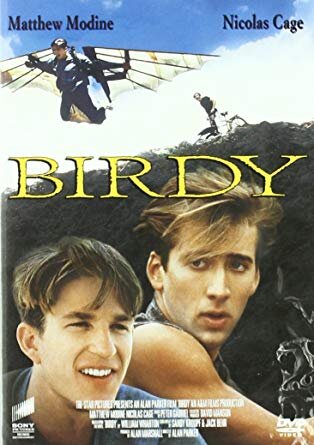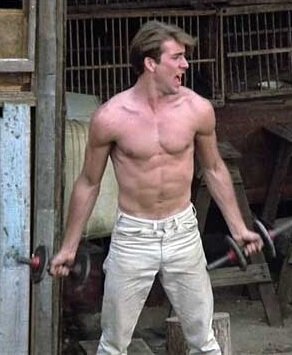The Travolta/Cage Project #11 Birdy (1984)
This box is bad but it’s also incredibly misleading!
A young, ferociously ambitious Nicolas Cage lost fifteen pounds, had two teeth pulled and slept with his face covered in bandages for a period of weeks to play an emotionally and physically shattered Vietnam veteran in 1984’s Birdy. He did not have to go to such extreme measures to pull off a convincing and memorable performance but this is Nicolas fucking Cage we’re talking about, not just any actor. So even at the start of his career as one of our most beloved and extreme oddballs he was ready, even eager to go to some very weird, very dark places for the sake of his art.
Alan Parker’s moody, powerful and extremely pretentious adaptation of William Wharton’s anti-war novel is an important film within the context of the hungry young actor’s career. It was not Cage’s first leading role, or even the first time he played an intense young man coming to terms with the crucible of war alongside his best friend. But it was the first time Cage played an insanely demanding lead role that took everything he had to give and then some.
But Birdy might be even more important within the context of Cage’s legend, his elaborately wrought mythology as a true artist who doesn’t just perform his roles so much as he lives them. For the first but certainly not the last time in his career, Cage took chances with a role that might strike others as crazy and deeply, perversely masochistic.
Like his uncle Francis, who famously went a little nutty shooting Apocalypse Now, Cage wasn’t just willing to suffer for his art; he was eager to suffer for his art, to inhabit a role with an intensity that borders on feral. The crazy thing about Birdy is that for all of the elaborate measures Cage took to punish himself in the name of art the future Oscar-winner does not have the most challenging role in the film. Not by a long shot.
The role of Alfonso "Al" Columbato is absurdly demanding but it’s an absolute breeze compared to the title role of Birdy, a mentally ill young man monomaniacally obsessed with birds and flight.
Matthew Modine plays the title role as someone who is cursed and damned to live in our dirty, corrupt, irredeemable world but who is not of our world, who seems to belong on a higher, purer plane, somewhere above the ugliness and squalor of our grubby, dying planet, with its war and bloodshed and free-floating madness.
As Birdy, Modine is naked for much of the film in a variety of bird-like poses. The horrors of war have rendered him catatonic, deliberately sub-human because to be human is just too goddamn painful to bear.
As a filmmaker, Parker is synonymous with music, whether in the form of musicals like Bugsy Malone, Fame and Pink Floyd’s The Wall or Midnight Express, which derived much of its sweaty, nightmarish power from Giorgio Moroder’s Oscar-winning score.
Birdy has a similarly audacious, attention-grabbing score from Peter Gabriel but otherwise you would imagine that it is too unrelentingly grim in its depiction of madness and war to allow for much in the way of fun pop music.
You would be wrong. Birdy is so heavy that I amused myself during particularly brutal moments by imagining it ending with the entire cast doing a sing-along of either The Time’s “The Bird” or “Surfin' Bird.”
In actuality, what Parker and his music supervisor decided was that this punishingly arty look at the angst of young men destroyed by war needed was a fun oldies staple to serve as its official “bros bonding fun-time anthem.”
I would argue that a psychodrama about the universal urge for transcendence and the madness of powerful men sending boys to die on their behalf doesn’t need a fun party song but that does not keep the film from splurging for the rights to Ritchie Valens’ “La Bamba”, which is played no less than three times, twice during primo bonding moments between Birdy and Al and (SPOILER) at the very end to let us know that Birdy did not climactically fly by leaping off the roof of a building to his death far below, which would be a total bummer, in keeping with the rest of the film.
Al and Birdy are the closest of friends despite having seemingly nothing in common. Al is a popular, athletic stud who can do everything and do it well. He’s a terrific athlete, has tons of friends, is absurdly good looking and has women flinging themselves at him in hopes he’ll give them the time of day.
If Al has all the social capital and currency in the world, Birdy has none. His mother is the weird lady who keeps all the balls that are hit into her yard, a quirk that ends up playing a prominent role in the narrative because this is not a subtle or understated movie.
But Birdy’s mom has nothing on her son in the eccentricity department. His life revolves solely around his all-consuming obsession with birds. There’s a wonderful scene that says just about everything about Al, Birdy and their curious but powerful bond where Al proposes that they hit the boardwalk to pick up some chicks, as horny young men like them are expected to do.
Sure enough, when we see them at the boardwalk they’re accompanied by two hot to trot young woman but they’re both clinging to Al while Birdy wanders around in the nearby vicinity, acting as if nothing in the world could interest him less than trying to score with a woman.
Absolutely nothing in Birdy suggests, let alone establishes, that its title character is heterosexual and a great deal that implies that he is either asexual or gay. When someone asks Al if he and Birdy were close and he replies that it wasn’t like they were queer for each other or nothing, it only serves to underline the very real possibility that what Al and Birdy share is more than just platonic.
In movies where a very popular kid befriends the school weirdo or outcast there’s often a cruel or transactional quality to that relationship, a sense that the outcast should be absurdly appreciative that anyone likes them, let alone one of the popular kids but there’s no element of that here.
The bond that Al and Birdy share is intense and passionate, and possibly sexual as well but it’s also incredibly tender. Birdy is most powerful and affecting as a love story between men; some of its most affecting moments come when Al is holding his broken and lost friend in his arms as they sit on the mental hospital floor, overcome with emotions too powerful to be able to understand or process.
Two men who are DEFINITELY not into each other or nothing.
Birdy is not a movie that calls for good acting. It calls for great ACTING! It’s a film that wears its ambitions and its artistry proudly, that takes itself very seriously and expects the audience to do likewise.
On the Travolta/Cage episode where we discuss Birdy and Moment by Moment, two very dissimilar films that share a fascinatingly uncommented upon gay subtext, the great Alonso Duralde talked about his journey with Birdy, how he went from seeing it as a profound and powerful masterpiece of the cinema as a young man to seeing it as an artful and sometimes moving film as an adult, but also one with a hopelessly adolescent conception of melodrama.
I understand where he’s coming from. Birdy is a very shallow person’s conception of a deep movie. It’s powered by symbolism that could not get any creakier or more heavy-handed, particularly in its central metaphor of flight as a means of emotional and spiritual transcendence.
Parker’s work is similarly unsubtle. The cult filmmaker faced a formidable challenge in adapting a novel where the conflict is overwhelmingly internal and the main character largely silent into a visually dynamic film. The direction here is as ballsy and intense as the acting and a script that’s nothing but big scenes and big emotions, particularly in a bravura late scene that uses a new device called a Skycam that functions as a sort of flying steadicam to realize Birdy’s lifelong fantasies of flight.
Birdy is so shamelessly, unapologetically melodramatic that there were times when I almost felt like I was watching one of the painfully cliched war movies satirized in Tropic Thunder but if Birdy sometimes lapses into overwrought self-parody it’s still an enormously affecting look at the never-ending psychological costs of war.
Watching Birdy I realized that I had confused it with the Vietnam movie Streamers all my life. That makes sense since Streamers also stars Matthew Modine and involves Vietnam and homosexuality and was directed by a major filmmaker in Robert Altman. Modine would go on to make one more Vietnam movie in the 1980s with a big shot filmmaker in Full Metal Jacket.
Yes, the Vietnam War was as good for Modine as an actor as it was bad for our country. Cage would go on to have huge successes that did not involve Vietnam but for one film at least, Cage and Modine were peers and colleagues whose guts performances and potent chemistry helped make Birdy a film of genuine quality and ambition. Birdy aspires nakedly for greatness it doesn’t quite achieve but there is glory and pathos and wonder in the noble attempt.
Pledge to the Happy Place and get sweet Weird Accordion to Al merch over at https://www.patreon.com/nathanrabinshappyplace/merch
And get in on Travolta/Cage at https://www.patreon.com/TravoltaCage
Or y’all can pre-order The Weird Accordion to Al







